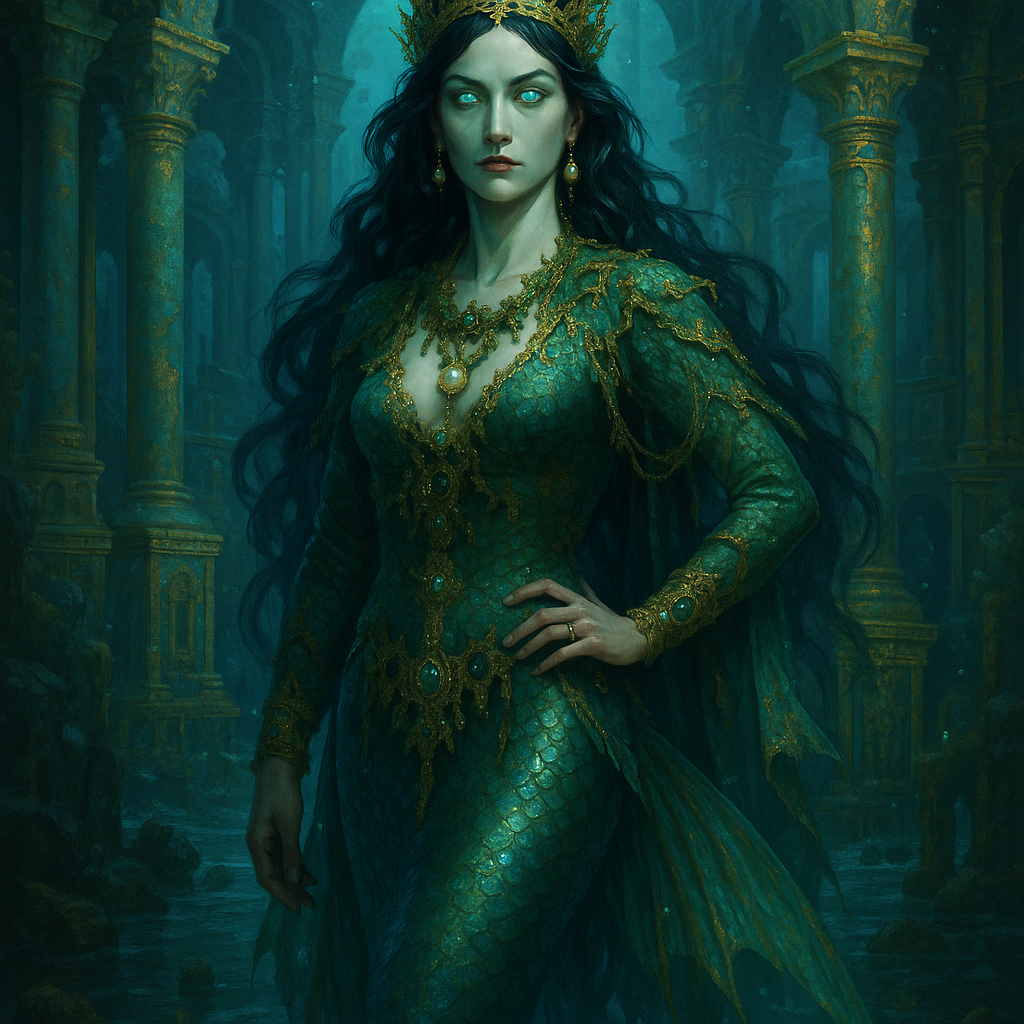Duhad Queen of Kêr-Is
Background:
Dahud verch Gralon was born between tide and throne—daughter to a mortal king and a Mari-Morgan, one of the fey sea-wives who dwell beneath the coastal waves of Brittany. Her birth was seen as a blessing by her father, a scandal by the Church, and a secret omen by the druids and sea-clerics who still remembered the old gods. From a young age, Dahud was a creature of duality: bound to land by duty, but called to water by instinct; schooled in Christian psalms, but haunted by the songs of the deep.
As she grew, it became clear that her gifts were not merely those of a noblewoman. Dahud could sense the moods of the sea, call birds from the sky, breathe underwater, and walk untouched through storm-swept shores. She understood dreams, tides, and silence better than any priest or scholar. Yet despite her powers—and the whispers they provoked—she remained fiercely loyal to her father, King Gralon, who loved her without condition.
But love could not protect them forever. As the sea threatened to swallow the island of Kêr-Is, her father’s masterful engineering spared the city with locks and dikes. He was lauded as a savior, a man of god. Dahud, meanwhile, watched as the Church and courtly powers turned cold. Her fey blood, her sorcery, her refusal to submit to patriarchal norms—these made her a target. Accusations grew like mold in the city’s heart: whispers of devilry, seduction, and forbidden rites.
When betrayal came, it was not from enemies abroad, but from within her own walls. The city revolted. She foresaw it through her magic—the mob, the flames, the spears—and worst of all, the vision of her father slain defending her. Her grief turned to fury, and in that rage she made her pact with Morvran fab Tegid, the Sea Raven, and opened the floodgates of Kêr-Is. The city was drowned.
But Dahud did not die. As the city fell, she embraced her legacy. She descended into the depths and, using ancient rites and pagan contracts, bound herself to Kêr-Is—not as its destroyer, but as its eternal queen. In doing so, she defied Morvran, denying him the souls of the drowned. Enraged, he cursed her and the city: Kêr-Is would rise again, only to be cast down once more, caught in a cycle of birth, glory, and cataclysm.
Now, Dahud rules the Drowned Court, a fey dominion in the Otherworld that exists between sea and myth. She is Queen of a city that cannot die, sovereign of spirits who are reborn and drowned in endless repetition. Among the sea-fey, she is revered as a queen of rare power and sorrow. Among land-bound mortals, she is remembered only as a villain—or a legend best not spoken of when the tide is high.
She has become a major power among the Fey Courts, particularly those aligned with water, twilight, and sorrow. Though she rarely intervenes in mortal affairs, she has been known to offer sanctuary to exiled nobles, cursed beings, and betrayed daughters. Her alliances are subtle, her enemies few but bitter, and her power in the Otherworld is second only to the great Archfey of the Sea.
She seeks no revenge. Only release.
Personality:
Queen Dahud is a paradox: serene yet stormbound, radiant yet mournful, kind yet capable of devastating fury. Time and tragedy have burned away her youthful recklessness, leaving behind a sovereign carved from sea-glass and sorrow. She wears her immortality with grace but not joy; she knows the names of every soul lost in Kêr-Is, and their weight rests on her shoulders like wet stone.
She is introspective and emotionally complex, often meditative and still—but not passive. She is a watcher, a listener, a queen who moves slowly but strikes decisively. To the foolish, she may seem distant or uncaring; to those who know pain, she is a silent sister. She does not tolerate cruelty, betrayal, or the misuse of power, especially from those who should know better.
While many fey are known for their capriciousness, Dahud is predictably tragic. Her moods follow the rhythm of the sea—calm one day, turbulent the next—but she does not toy with hearts or lie for sport. Her words are deliberate. Her gaze can pierce illusions. She has no interest in controlling others, only in guiding them… or warning them.
To her allies, she is unwavering and generous—offering sanctuary, arcane knowledge, and unshakable loyalty. To her enemies, she is the coming tide: slow, unstoppable, and devastating. Those who wrong her may not suffer immediately, but they will suffer inevitably. She does not forget.
Despite all this, Dahud still believes in beauty, in music, in moments of joy. She sings to her city as it sinks. She comforts the ghosts who scream in her arms. She dances alone when no one watches. She dreams—quietly, impossibly—of the curse one day breaking.
In the end, she is not a tyrant. She is not a martyr.
She is a queen—a witch, a daughter, a goddess-in-exile—doing what she can in a world that refuses to let her forget.
Dahud verch Gralon was born between tide and throne—daughter to a mortal king and a Mari-Morgan, one of the fey sea-wives who dwell beneath the coastal waves of Brittany. Her birth was seen as a blessing by her father, a scandal by the Church, and a secret omen by the druids and sea-clerics who still remembered the old gods. From a young age, Dahud was a creature of duality: bound to land by duty, but called to water by instinct; schooled in Christian psalms, but haunted by the songs of the deep.
As she grew, it became clear that her gifts were not merely those of a noblewoman. Dahud could sense the moods of the sea, call birds from the sky, breathe underwater, and walk untouched through storm-swept shores. She understood dreams, tides, and silence better than any priest or scholar. Yet despite her powers—and the whispers they provoked—she remained fiercely loyal to her father, King Gralon, who loved her without condition.
But love could not protect them forever. As the sea threatened to swallow the island of Kêr-Is, her father’s masterful engineering spared the city with locks and dikes. He was lauded as a savior, a man of god. Dahud, meanwhile, watched as the Church and courtly powers turned cold. Her fey blood, her sorcery, her refusal to submit to patriarchal norms—these made her a target. Accusations grew like mold in the city’s heart: whispers of devilry, seduction, and forbidden rites.
When betrayal came, it was not from enemies abroad, but from within her own walls. The city revolted. She foresaw it through her magic—the mob, the flames, the spears—and worst of all, the vision of her father slain defending her. Her grief turned to fury, and in that rage she made her pact with Morvran fab Tegid, the Sea Raven, and opened the floodgates of Kêr-Is. The city was drowned.
But Dahud did not die. As the city fell, she embraced her legacy. She descended into the depths and, using ancient rites and pagan contracts, bound herself to Kêr-Is—not as its destroyer, but as its eternal queen. In doing so, she defied Morvran, denying him the souls of the drowned. Enraged, he cursed her and the city: Kêr-Is would rise again, only to be cast down once more, caught in a cycle of birth, glory, and cataclysm.
Now, Dahud rules the Drowned Court, a fey dominion in the Otherworld that exists between sea and myth. She is Queen of a city that cannot die, sovereign of spirits who are reborn and drowned in endless repetition. Among the sea-fey, she is revered as a queen of rare power and sorrow. Among land-bound mortals, she is remembered only as a villain—or a legend best not spoken of when the tide is high.
She has become a major power among the Fey Courts, particularly those aligned with water, twilight, and sorrow. Though she rarely intervenes in mortal affairs, she has been known to offer sanctuary to exiled nobles, cursed beings, and betrayed daughters. Her alliances are subtle, her enemies few but bitter, and her power in the Otherworld is second only to the great Archfey of the Sea.
She seeks no revenge. Only release.
Personality:
Queen Dahud is a paradox: serene yet stormbound, radiant yet mournful, kind yet capable of devastating fury. Time and tragedy have burned away her youthful recklessness, leaving behind a sovereign carved from sea-glass and sorrow. She wears her immortality with grace but not joy; she knows the names of every soul lost in Kêr-Is, and their weight rests on her shoulders like wet stone.
She is introspective and emotionally complex, often meditative and still—but not passive. She is a watcher, a listener, a queen who moves slowly but strikes decisively. To the foolish, she may seem distant or uncaring; to those who know pain, she is a silent sister. She does not tolerate cruelty, betrayal, or the misuse of power, especially from those who should know better.
While many fey are known for their capriciousness, Dahud is predictably tragic. Her moods follow the rhythm of the sea—calm one day, turbulent the next—but she does not toy with hearts or lie for sport. Her words are deliberate. Her gaze can pierce illusions. She has no interest in controlling others, only in guiding them… or warning them.
To her allies, she is unwavering and generous—offering sanctuary, arcane knowledge, and unshakable loyalty. To her enemies, she is the coming tide: slow, unstoppable, and devastating. Those who wrong her may not suffer immediately, but they will suffer inevitably. She does not forget.
Despite all this, Dahud still believes in beauty, in music, in moments of joy. She sings to her city as it sinks. She comforts the ghosts who scream in her arms. She dances alone when no one watches. She dreams—quietly, impossibly—of the curse one day breaking.
In the end, she is not a tyrant. She is not a martyr.
She is a queen—a witch, a daughter, a goddess-in-exile—doing what she can in a world that refuses to let her forget.





Comments